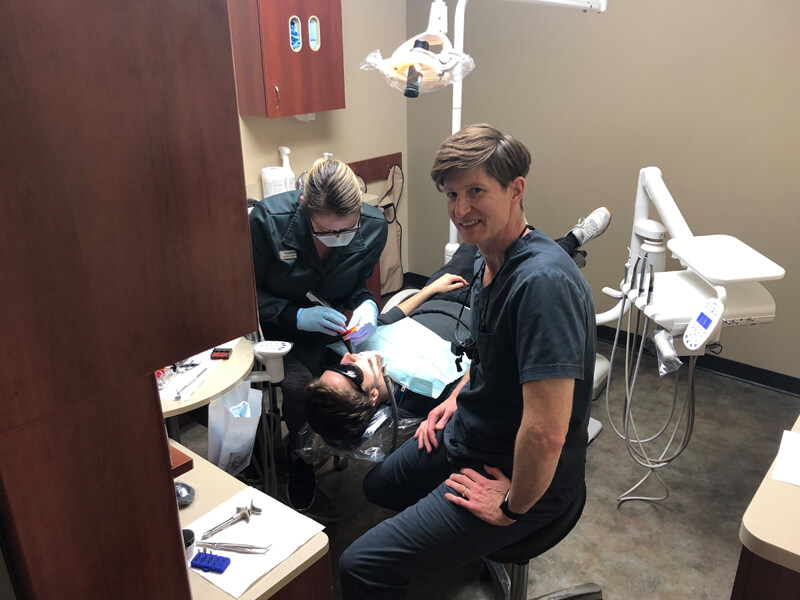Sleep Apnea Treatment
Sleep better tonight for a healthier tomorrow.
Sleep apnea is a serious medical condition. A person suffering from sleep apnea does not get sufficient oxygen at night because they stop breathing multiple times while asleep. When their breathing becomes interrupted, they fail to get adequate rest because their brain, deprived of oxygen, needs to gently rouse them numerous times throughout the night.
Contact Soundview Family Dental today! We can help.

Sleep apnea 101
Sleep apnea is, generally speaking, caused by the soft tissues of the tongue and throat obstructing (blocking) the airway during sleep. Men and people who are heavier or overweight are more likely to suffer from sleep apnea, although anyone can have sleep apnea due to the natural shape of the inside of their nose and throat.
The most commonly observed feature amongst sleep apnea sufferers is loud persistent snoring. Often, sleep apnea is caught because the partner or roommate of the sufferer complains that they should have their snoring checked by a doctor.
Let us care for your smile!
Schedule an appointment with us today
Benefits of
sleep apnea treatment
Do you struggle with snoring or sleep apnea? These conditions can negatively impact your sleep quality and overall health. Luckily, there are treatments available to help alleviate these symptoms. A dentist can provide a custom oral appliance that can help keep your airway open while you sleep, leading to better breathing and more restful sleep. Say goodbye to restless nights and tired days with sleep apnea treatment from your dentist.
Improved Sleep Quality
Sleep apnea treatment can improve your quality of sleep, allowing you to wake up feeling rested and refreshed.
Reduced Risk of Health Problems
Treating sleep apnea can help reduce the risk of developing health problems such as high blood pressure, diabetes, and heart disease.
Improved Mood and Mental Health
Treating sleep apnea can improve your mood and mental health, reducing the risk of anxiety, depression, and other mental health conditions.
Increased Energy and Productivity
With better sleep comes increased energy and productivity, allowing you to feel more alert and focused throughout the day.
Decreased Snoring
Sleep apnea treatment can also help reduce or eliminate snoring, which can improve your partner’s quality of sleep as well.
Sleep apnea treatment
We can help some sleep apnea sufferers with their sleep without a loud, uncomfortable CPAP machine. We can fit you with a mouthguard in office that repositions your jaw while you sleep to help keep your airway open. The more comfortable mouthguard you use is far more effective against sleep apnea than the bulky uncomfortable CPAP machine you won’t use.
Treating sleep apnea at Soundview Family Dental can greatly improve your quality of life by improving your quality of sleep.
Our guarantee
Our office provides personalized and effective sleep apnea treatment to help you improve your sleep quality and overall health. Dr. Kitts, our skilled dentist, and our team use the latest technology and techniques, including oral appliance therapy and CPAP alternatives, to treat sleep apnea and help you breathe easier during sleep. We will carefully evaluate your sleep patterns and recommend the best course of action to meet your unique needs. Our compassionate and knowledgeable team is dedicated to providing you with a comfortable and stress-free experience.
Contact us
If you have any questions about sleep apnea or would like to schedule a visit with your Edmonds dentist, Dr. Eric Kitts. Give us a call or request an appointment online today!
FAQ
What is sleep apnea?
Sleep apnea is a serious sleep disorder in which a person’s breathing is repeatedly interrupted during sleep. There are three types of sleep apnea:
- Obstructive sleep apnea (OSA): The most common form, caused by a blockage of the airway due to the relaxation of throat muscles.
- Central sleep apnea (CSA): Occurs when the brain doesn’t send proper signals to the muscles that control breathing.
- Complex sleep apnea syndrome: Also known as treatment-emergent central sleep apnea, it’s a combination of both OSA and CSA.
What are the symptoms of sleep apnea?
Common symptoms of sleep apnea include:
- Loud, persistent snoring.
- Choking, gasping, or snorting during sleep.
- Pauses in breathing during sleep, often followed by a choking sound.
- Waking up with a dry mouth or sore throat.
- Daytime sleepiness or fatigue.
- Difficulty concentrating or irritability.
- Morning headaches.
How is sleep apnea diagnosed?
What is the connection between sleep apnea and dentistry?
What are the treatment options for sleep apnea?
Treatment options for sleep apnea depend on the type and severity of the condition. Some common treatments include:
- Lifestyle changes: Losing weight, avoiding alcohol and sedatives, and changing sleep positions can help improve symptoms.
Continuous positive airway pressure - (CPAP) therapy: A machine that delivers air pressure through a mask to keep the airway open during sleep, commonly used for moderate to severe OSA.
- Oral appliances: Custom-made dental devices that reposition the jaw and tongue to maintain an open airway, often used for mild to moderate OSA.
- Surgery: In some cases, surgical procedures may be recommended to remove excess tissue or correct structural abnormalities contributing to sleep apnea.
It’s essential to consult with a sleep specialist or dentist to determine the appropriate treatment plan for your specific situation.
Our general dentistry services
Cleanings • Root Canals • Fillings • Emergency Care • Hygiene • Oral Cancer Screening • Pediatrics • Periodontics • Receding Gum Treatment • TMJ/TMD • Mouthguards • Sleep Apnea • Comfort First


